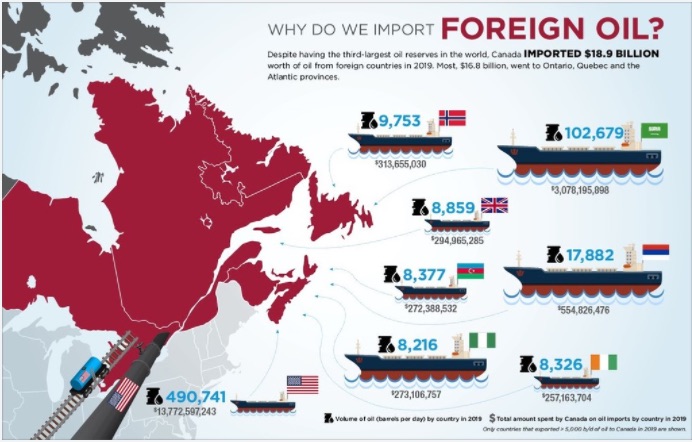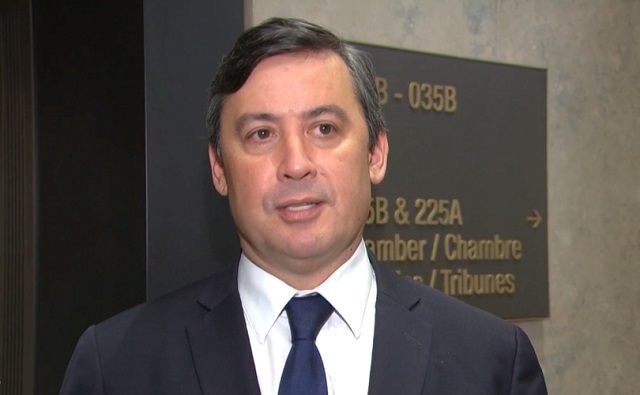Economy
Canada is not a serious country… Danielle Smith

From Danielle Smith
I read an infographic that said Canada has bought $13 billion worth of petroleum products from Russia since 2000 – we buy from them at a rate of $550 million a year. What the hell are we doing?
The situation for Ukraine looks very grave indeed. Most commentators thought Vladimir Putin was going to “liberate” the two Russia friendly break off republics of Donetsk and Luhansk. What a surprise to the world to find Russian soldiers in Kyiv among other incursions.
It is pretty clear the Russian leader intends to take all of Ukraine.
But we also must not be naïve about Putin’s aspirations. A Polish friend of mine – who remembers watching Russian tanks roll into her town outside her street when she was seven years old – is under no illusions about how far Putin intends to go.
She fully expects Belarus, Lithuania, Latvia, Estonia, Kazakhstan and possibly Moldova to be next. She believes Putin wants to assemble the Soviet Union 2.0, with the ultimate aim of controlling the energy supply to the rest of the world.
So how does this play out?
Just like you I’ve been trying to sort through the conflicting media coverage to find out what is really going on. If indeed there are Ukraine substates that genuinely want to be independent, I don’t have a particular problem with that. As I said in a Locals post, post WWII the powers that be made a lot of blunders redrawing the map of Europe and the Middle East, cramming people together under a national flag even if they hated each other, so perhaps some aspirations for independence are legitimate. But it’s clear that Putin’s aspiration goes far beyond Crimea, Donetsk and Luhansk. It appears now that he wants the whole thing. But why?
First off, though it’s sad to say, there hasn’t been much honest reporting about Ukraine and Russia starting in the Trump years so almost everything you read will be through the lens of people who hate Trump (who clearly understood Putin’s strength and saw no need to antagonize him) and Biden (whose family had strange dealings in Ukraine no one wants to talk about).
In addition there is so much propaganda floating around the web I’d be reluctant to retweet any stories of “bravery” unless they’ve been verified. Here’s a good summary of the lies so far: The Ghost of Kiev, the woman with the sunflower seeds, footage of things being shot down or blown up – so far most of these stories are outright falsehoods or images from video games or prior conflicts. The “Russian Warship Go Fuck Yourself” holdouts was partly true: yes they said it, but they didn’t die in a missile attack. They were all apprehended and taken alive.
So know that you have to read everything knowing that the writer is trying to manipulate you. I’m just trying to figure out what is actually going on. It’s not easy.
To that end…
The mainstream view as reported on BBC, is that Russia feels threatened by a modern Ukraine and irrationally believes it has been taken over by extremists and Nazis. I guess calling one’s political opponents “Nazis” is the new all-purpose smear being used by Russian Presidents and Canadian Prime Ministers alike to justify war measures. In any case, this analysis left me unsatisfied as it seemed a bit shallow and one-sided like so much of MSM these days.
Social media isn’t doing much better, and the commentariat seems to think this is the time to practice their best pop culture zingers. It’s kind of humiliating to read this piece that calls out the Harry Potter references, the self-care links and the demands to “deplatform” Russia: “If the West saw Ukraine and its cause as truly important, something worth paying a price to assist, they would sanction Russia’s energy sector. But they do not (even the Globalist American Empire must sometimes face reality). So instead, we get a parade of symbolic sanctions, passive-aggressive gestures of anger and hostility. In fact, the tactics the GAE uses against Russia — social ostracisim, deplatforming, and performative public condemnation — are the same feminine tools that it uses domestically to ruins the lives of people who use a politically incorrect word or donate to the wrong protest.” Ouch.
Here’s a video from a podcaster imbedded in Kyiv who says openly, “you’ll probably think I’m a Russian stooge” so he may indeed be a Russian stooge, but he explains why he thinks Russia (so far) has been restrained in its attack. He believes Ukrainians are fleeing because Ukraine President Volodymyr Zelensky is endangering them, by putting Kalashnikovs in the hands of untrained civilians who are going to be killed when confronted by professional Russian soldiers, and mandating military service for every man aged 18 to 60. He does not believe the Russians intend to cause mass casualties or destruction, but that they will kill if someone is pointing a gun at them, which will allow more reports depicting Putin’s viciousness.
He also explains how important Kyiv is to the Russian foundational story. As far as Putin is concerned, Ukraine is Russia, and he expected to be treated as a liberator when he arrived. He also outlined the different military tactics of Russia to explain why the West is saying that Russia is losing. When the US enters a country they do scorched earth and blow everything up – roads, bridges, electrical grids, water plants and so on. The fact that Putin is not doing that is being perceived as weakness. But if Putin wants Ukraine to be part of Russia permanently, it would make no sense to destroy everything. That doesn’t engender good feelings. Putin wants a puppet regime in Ukraine friendly to Russia’s interests – he doesn’t want to raze the joint or blow it smithereens.
Finally, this piece helped put a lot into perspective for me. “Ukraine’s Deadly Gamble” by Lee Smith has the ring of truth about it. He depicts it thus: “…(T)he Ukrainians made a geopolitical blunder that statesmen will study for years to come: A buffer state had staked its future on a distant power that had simply seen it as an instrument to annoy its powerful neighbor with no attachment to any larger strategic concept that it was willing to support.” They were a pawn in the game to help discredit Trump with the Russian collusion story, then when Trump started poking around to find out what the Bidens were up to in Ukraine, they played a willing role to aid his impeachment. Now they find out the Americans just aren’t that into them after all.
In the end, mid-size powers sleeping next to giants have to realize that their continued ability to remain independent is measured by whether they are perceived as antagonistic to the giant’s interests. If the situation was reversed – if Canada started cozying up to Russia and helping to sabotage US presidents to curry favour with Russia – I don’t think it would go well for us either. Maybe not full scale invasion, but the Americans hold life or death power over our economy so it wouldn’t be a wise move. Sad that regular citizens become the collateral damage in the decisions of their elected leaders. But that’s why elections matter.
If Canada was a serious grown-up country with a serious grown-up leader we’d be able to say “we can help” without being laughed off the world stage. We can help, in a very practical way. We can help wean the world off Russian oil and natural gas. We could ask Quebec to stop thinking only about itself for a change and reverse its announced ban on oil and natural gas extraction. Trudeau could declare multiple projects in the global interest and work with First Nations partners to complete Transmountain Pipeline and build Northern Gateway, work with Biden to build Keystone XL and with the provinces of QB and NB to build Energy East. He would use his powers under the Constitution to tell Quebec they can not block LNG Export from Saguenay, and he’d post a sentry of protectors for Coastal Gas Link to make sure it gets completed too.But look at this silliness: “despite the fact that 18 LNG export terminals have been proposed in Canada over the years, and 24 long-term LNG export licenses have been granted since 2011, a grand total of zero have been built.” We have failed the world with Trudeau’s anti-carbon-dioxide obsession. Let’s not forget it.
Canada is key to energy security and affordability for North America and our European allies, and we could hit Russia where it hurts. If we wanted to be a meaningful player on the international stage we would embrace it.
Instead we have a federal Environment Minister who made his name scaling the CN Tower and Ralph Klein’s house to oppose fossil fuels, and we’ve joined the Build Back Better brigade pretending the world can survive on wind turbines and solar panels alone.
Canada is not a serious place and our friends in Eastern Europe are now paying the price for it. Such a tragedy.
For more from Daniel Smith
|
|
|
|
|
|
|
Business
Canada’s economy has stagnated despite Ottawa’s spin

From the Fraser Institute
By Ben Eisen, Milagros Palacios and Lawrence Schembri
Canada’s inflation-adjusted per-person annual economic growth rate (0.7 per cent) is meaningfully worse than the G7 average (1.0 per cent) over this same period. The gap with the U.S. (1.2 per cent) is even larger. Only Italy performed worse than Canada.
Growth in gross domestic product (GDP), the total value of all goods and services produced in the economy annually, is one of the most frequently cited indicators of Canada’s economic performance. Journalists, politicians and analysts often compare various measures of Canada’s total GDP growth to other countries, or to Canada’s past performance, to assess the health of the economy and living standards. However, this statistic is misleading as a measure of living standards when population growth rates vary greatly across countries or over time.
Federal Finance Minister Chrystia Freeland, for example, recently boasted that Canada had experienced the “strongest economic growth in the G7” in 2022. Although the Trudeau government often uses international comparisons on aggregate GDP growth as evidence of economic success, it’s not the first to do so. In 2015, then-prime minister Stephen Harper said Canada’s GDP growth was “head and shoulders above all our G7 partners over the long term.”
Unfortunately, such statements do more to obscure public understanding of Canada’s economic performance than enlighten it. In reality, aggregate GDP growth statistics are not driven by productivity improvements and do not reflect rising living standards. Instead, they’re primarily the result of differences in population and labour force growth. In other words, they aren’t primarily the result of Canadians becoming better at producing goods and services (i.e. productivity) and thus generating more income for their families. Instead, they primarily reflect the fact that there are simply more people working, which increases the total amount of goods and services produced but doesn’t necessarily translate into increased living standards.
Let’s look at the numbers. Canada’s annual average GDP growth (with no adjustment for population) from 2000 to 2023 was the second-highest in the G7 at 1.8 per cent, just behind the United States at 1.9 per cent. That sounds good, until you make a simple adjustment for population changes by comparing GDP per person. Then a completely different story emerges.
Canada’s inflation-adjusted per-person annual economic growth rate (0.7 per cent) is meaningfully worse than the G7 average (1.0 per cent) over this same period. The gap with the U.S. (1.2 per cent) is even larger. Only Italy performed worse than Canada.
Why the inversion of results from good to bad? Because Canada has had by far the fastest population growth rate in the G7, growing at an annualized rate of 1.1 per cent—more than twice the annual population growth rate of the G7 as a whole at 0.5 per cent. In aggregate, Canada’s population increased by 29.8 per cent during this time period compared to just 11.5 per cent in the entire G7.
Clearly, aggregate GDP growth is a poor tool for international comparisons. It’s also not a good way to assess changes in Canada’s performance over time because Canada’s rate of population growth has not been constant. Starting in 2016, sharply higher rates of immigration have led to a pronounced increase in population growth. This increase has effectively partially obscured historically weak economic growth per person over the same period.
Specifically, from 2015 to 2023, under the Trudeau government, inflation-adjusted per-person economic growth averaged just 0.3 per cent. For historical perspective, per-person economic growth was 0.8 per cent annually under Brian Mulroney, 2.4 per cent under Jean Chrétien and 2.0 per cent under Paul Martin.
Due to Canada’s sharp increase in population growth in recent years, aggregate GDP growth is a misleading indicator for comparing economic growth performance across countries or time periods. Canada is not leading the G7, or doing well in historical terms, when it comes to economic growth measures that make simple adjustments for our rapidly growing population. In reality, we’ve become a growth laggard and our living standards have largely stagnated for the better part of a decade.
Authors:
Business
New capital gains hike won’t work as claimed but will harm the economy

From the Fraser Institute
By Alex Whalen and Jake Fuss
Capital taxes are among the most economically-damaging forms of taxation precisely because they reduce the incentive to innovate and invest.
Amid a federal budget riddled with red ink and tax hikes, the Trudeau government has increased capital gains taxes. The move will be disastrous for Canada’s growth prospects and its already-lagging investment climate, and to make matters worse, research suggests it won’t work as planned.
Currently, individuals and businesses who sell a capital asset in Canada incur capital gains taxes at a 50 per cent inclusion rate, which means that 50 per cent of the gain in the asset’s value is subject to taxation at the individual or business’ marginal tax rate. The Trudeau government is raising this inclusion rate to 66.6 per cent for all businesses, trusts and individuals with capital gains over $250,000.
The problems with hiking capital gains taxes are numerous.
First, capital gains are taxed on a “realization” basis, which means the investor does not incur capital gains taxes until the asset is sold. According to empirical evidence, this creates a “lock-in” effect where investors have an incentive to keep their capital invested in a particular asset when they might otherwise sell.
For example, investors may delay selling capital assets because they anticipate a change in government and a reversal back to the previous inclusion rate. This means the Trudeau government is likely overestimating the potential revenue gains from its capital gains tax hike, given that individual investors will adjust the timing of their asset sales in response to the tax hike.
Second, the lock-in effect creates a drag on economic growth as it incentivises investors to hold off selling their assets when they otherwise might, preventing capital from being deployed to its most productive use and therefore reducing growth.
And Canada’s growth prospects and investment climate have both been in decline. Canada currently faces the lowest growth prospects among all OECD countries in terms of GDP per person. Further, between 2014 and 2021, business investment (adjusted for inflation) in Canada declined by $43.7 billion. Hiking taxes on capital will make both pressing issues worse.
Contrary to the government’s framing—that this move only affects the wealthy—lagging business investment and slow growth affect all Canadians through lower incomes and living standards. Capital taxes are among the most economically-damaging forms of taxation precisely because they reduce the incentive to innovate and invest. And while taxes on capital do raise revenue, the economic costs exceed the amount of tax collected.
Previous governments in Canada understood these facts. In the 2000 federal budget, then-finance minister Paul Martin said a “key factor contributing to the difficulty of raising capital by new start-ups is the fact that individuals who sell existing investments and reinvest in others must pay tax on any realized capital gains,” an explicit acknowledgement of the lock-in effect and costs of capital gains taxes. Further, that Liberal government reduced the capital gains inclusion rate, acknowledging the importance of a strong investment climate.
At a time when Canada badly needs to improve the incentives to invest, the Trudeau government’s 2024 budget has introduced a damaging tax hike. In delivering the budget, Finance Minister Chrystia Freeland said “Canada, a growing country, needs to make investments in our country and in Canadians right now.” Individuals and businesses across the country likely agree on the importance of investment. Hiking capital gains taxes will achieve the exact opposite effect.
Authors:
-

 COVID-195 hours ago
COVID-195 hours agoCDC Quietly Admits to Covid Policy Failures
-

 COVID-198 hours ago
COVID-198 hours agoJapanese study shows disturbing increase in cancer related deaths during the Covid pandemic
-

 Great Reset3 hours ago
Great Reset3 hours agoClimate expert warns against extreme ‘weather porn’ from alarmists pushing ‘draconian’ policies
-

 Alberta2 days ago
Alberta2 days agoDanielle Smith warns arsonists who start wildfires in Alberta that they will be held accountable
-

 Bruce Dowbiggin1 day ago
Bruce Dowbiggin1 day agoWhy Are Canadian Mayors So Far Left And Out Of Touch?
-

 National2 days ago
National2 days agoCanada’s Governor General slammed for hosting partisan event promoting Trudeau’s ‘hate speech’ bill
-

 Economy1 day ago
Economy1 day agoExtreme Weather and Climate Change
-

 International1 day ago
International1 day agoTelegram founder tells Tucker Carlson that US intel agents tried to spy on user messages








